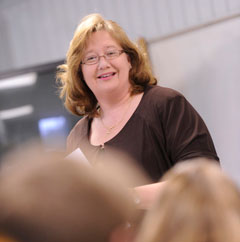A Math Teacher’s Journey to the Classroom
By Shelley Stewart
 |
Terri Hipps came back to UAB in 2009 to finish her degree in mathematical reasoning—more than two decades after she first started. Now a math teacher at Vincent Middle/High School, Hipps was honored as the Shelby County Board of Education's 2010 First-Year Teacher of the Year. |
Terri Hipps has taught school for decades, but it’s only in the last few months that she’s started receiving a paycheck. After home-schooling her own children and tutoring dozens of others, Hipps came back to UAB to finish her degree in 2009—following a 21-year break. Her goal was to put her teaching skills to the test in public-school classrooms. She passed with flying colors: Hipps, who now teaches advanced math courses at Vincent Middle/High School outside Birmingham, was honored as the Shelby County Board of Education’s 2010 First-Year Teacher of the Year.
Teaching was never part of Terri Hipps’s life plan, but somehow it kept coming up. When she first started at UAB in the 1980s, she enrolled in the nursing program. One day a professor took her aside and advised her to consider teaching instead; he had seen how her fellow students improved after Hipps tutored them.
Hipps changed her major to mathematical reasoning, but before she could get her degree, she received a higher calling: As young newlyweds, she and her husband became intent on Christian missionary work. After completing intensive training, they were on the verge of moving to Micronesia, “and the only thing we knew is that we’d need to home-educate any future children because there were no schools where we were going,” Hipps explains.
But then a serious health problem arose in the family, and the couple stayed in Alabama. Five children arrived, one every year. Their firstborn, now a successful Web developer, was born with severe learning difficulties, and their third had extreme dyslexia. Few, if any, specialized programs were available in area public schools, so Hipps studied various teaching techniques and, motivated by an urgent sense of purpose, began home-schooling the children.
Teaching Motivation
Rather than follow a rote formula, Hipps tailored her instruction to each child’s particular learning style. Defying the gloomy predictions of specialists—one of whom said her firstborn would probably never advance beyond a fourth-grade level—the Hipps kids thrived under their mother’s tutelage.
Other children benefited as well. As her kids neared college age, Hipps volunteered in a church co-op, tutoring 60 to 80 students in math and science. “These children, all home-schooled, had to do well on their ACT or SAT tests because otherwise, under Alabama law, each would have been required to obtain a GED and then enter college on probation,” she says.
Hipps also works with the Upward Bound program, which offers one-to-one tutoring to college-bound students from low-income and first-generation families. “Students in this program take supplemental classes while still in high school to ensure graduation and in preparation for college-level courses,” Hipps explains. “My job was making sure they did well enough on the ACT to qualify for college and scholarships. The young people are extremely motivated because, for them, the program is a lifeline. It may be their only chance to attend college, and they know it. This made it one of the most uplifting and challenging things I’ve ever done.”
Back to School
At the age of 45, Hipps sought out another challenge: returning to UAB to finish her degree in mathematical reasoning. “I lacked only 11 courses when I left to have my first child, so I didn’t have much more to do,” she says. “I just took a little 21-year break.”
Getting those final credits took a toll. “That was the hardest year I’ve ever had,” Hipps says. Most of her classes were at night. (UAB’s flexible class schedules were a big draw in her return, she says.) During the day, in addition to studying and caring for her family, Hipps continued tutoring. “The kids I mentored were counting on me,” she says.
In mid-2009, seeing the outstanding success rate of Hipps’s Upward Bound students, the principal of Vincent Middle/High School asked her to consider teaching there when she finished her degree. Hipps jumped at the opportunity, despite knowing the difficulties faced by the students and teachers at the school.
A Teacher, Tested
Even though she had some idea of what to expect, the first few weeks of school were a “major adjustment,” Hipps recalls. “The students really tested me.” Hipps kept going, working after school and on weekends with underachieving students—and she would often finish these sessions by driving the students home. As they responded to her enthusiasm and evident concern, the students grasped the complex subject matter and things greatly improved. “Now I feel at home” in the classroom, she says.
Throughout her first year, Hipps has drawn on many valuable lessons, she says. “My mother and my father were my very best teachers, because they taught me to instill discipline. Without discipline, it’s impossible to teach anything. I also believe that teachers need schooling to learn how to teach, and that’s why UAB has been so important. Doing your best requires knowing how to do it.”
Despite the accolades she has received, Hipps isn’t ready to claim that she knows how to do it all in the classroom. Taking her own advice, she is now back at UAB for more night classes—working toward a fifth-year master’s degree in education.